UK PMIs: Manufacturing beats forecasts to rise for sixth month in a row

UK manufacturing activity increased for the sixth straight month in November as factories brushed off the impact of the second national lockdown.
The IHS Markit/Cips manufacturing purchasing managers (PMI) index stood at 55.6 in November, with any score above the 50 mark indicating growth.
The score came in ahead of flash estimates of 55.2, as rates of growth in output, new business accelerated and the downturn in employment slowed.
Unlike during the first lockdown, factories were able to stay open through November, thus keeping production running.
The latest reading marked a considerable improvement from October, when the index stood at 53.7.
The figures showed that the UK outperformed the Eurozone in terms of manufacturing output in November. The bloc recorded a reading of 53.8, down from October’s score of 54.8.
Rob Dobson, director at IHS Markit, said: “Growth of the UK manufacturing sector picked up in November, temporarily boosted by ‘Brexit-buying’ among clients and the ongoing boost from economies re-opening following lockdowns earlier in the year.
“The effects were strongest felt among firms supplying inputs to other companies as warehouses were restocked, and among producers of investment goods such as machinery and equipment.
Before the Open newsletter: Start your day with the City View podcast and key market data
“The weak point was the consumer goods industry, which saw lower output and new order intakes amid depressed household sentiment.”
However, Dobson warned that it was uncertain whether the boost in manufacturing would survive into the new year.
But, he added, sector confidence has now risen to levels not seen since 2014, with three-fifths of manufacturers expecting to see output rise over the next 12 months.
And Samuel Tombs, chief UK economist at Pantheon Macroeconomics, said that the figures “flattered to deceive”.
He explained: “The manufacturing sector’s recovery is not progressing as quickly as the PMI suggests. The PMI has been boosted by a jump in the stocks of purchases index and a decline in the suppliers’ delivery times index.
“The latter is inverted in the PMI calculation, and its decline signals that manufacturers are waiting longer for imported components.
“Pre-Brexit stockpiling by U.K. manufacturers of the inputs they need to run smoothly next year, if no trade deal is agreed with the E.U. by December 31, is the underlying driver of these movements.”
The increase came despite the fact that manufacturing orders slipped back last month, according to data from the CBI.
The CBI’s monthly measure of manufacturing order books fell to a score of minus 40 in November, well below the long-run average of minus 14.